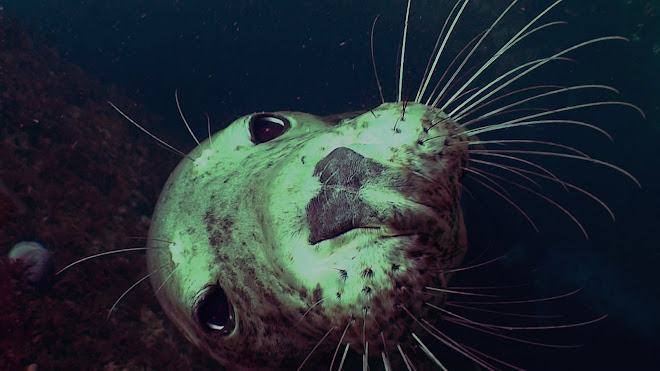
Having spent a large amount of my spare time studying the underwater behaviour of grey seals (Halichoerus grypus) I would like to share some of the insights with fellow wildlife enthusiasts and scuba divers.
To provide a very brief background I started at a young age and have been diving for over 20 years. I have a background in marine biology having studied at Southampton University.
I dive with compressed air and do not use rebreathers. Most of my diving is in less than 20m of water. My typical dive times are comparitively long at 90mins. Dives can last over 2 hrs.
I dive all year round.
In the last 7 years I have been fortunate to have dived extensively off the Farne Islands, Northumberland, and at a number of lesser known spots on the NE coast of the UK with grey seals.
GREY SEALS
Many of you will know as much (if not more!) about grey seals than I do, so I will not attempt to provide a detailed outline of grey seal biology, however, I will provide some brief facts.
Grey seals typically live to 25yrs for males and 35yrs for females- (oldest male on record 29yrs/female 46yrs). They start breeding age 3-7yrs. Pups weigh approx. 15kg at birth and put on 1-2kg day, drinking high fat milk, and weigh approx 45kg when weaned aged 3 weeks.
Adult females weigh 154kg and males 220kg - males have been known to grow to 350kg.
"Just like a little underwater puppy"..... I think not! Average male adult labrador dog 34kg
Grey seals can dive to over 300m and can remain submerged for over 20mins but generally dive for less than 10 mins to depths less than 50m.
They have a range of bacteria in their mouths that can make bites rather unpleasant.
Breeding in grey seals tends to occur straight after the pups have been weaned and it is thought that once weaned female grey seals abandon their pups to fend for themselves.
Seals are prone to eye infections and corneal ulcers (from scratches to eye) can lead to blindness.
Enough of the well known facts!
I have over the years developed a number of techniques that have helped facilitate interactions & have allowed me to gain an insight into the underwater lives of these creatures.
I have over the years developed a number of techniques that have helped facilitate interactions & have allowed me to gain an insight into the underwater lives of these creatures.
These include - hand and body movements and gestures, vocalizations and exteremely careful buoyancy control with very measured movements underwater.
Why spend time underwater with seals?
I have a busy, stressful job and I find that time underwater is very relaxing. There is something magical about being in the company of wild animals.
When a group of seals allows you to lie with them, accepted as not being a threat, on the sea bed as they rest, eyes closed it is a great privilege!
Likewise when a young seal pup chooses to play with you, holding your hand with it's front flipper and "nuzzling" you face to face this is a rare moment that is exceedingly peaceful!
Seals are very individual and like anyone who has ever known a dog or cat they have very different personalities!Some are shy and curious, others bold and inquisitive. Underwater they are all exceedingly gentle! Even large bull seals that rarely interact are gentle and playful when they do. Inexperienced divers can be harrassed by a playful adolescent that finds amusement in playing a game of "nip the divers fins and scare them" and I have seen a few seals do this! Sometimes the divers panic and the seals think that it is a game. I have also watched carefully as a couple of seals follow a pair of divers and take turns approaching them and pulling on their fins, before moving out of sight, leaving the divers slightly bewildered!




No comments:
Post a Comment